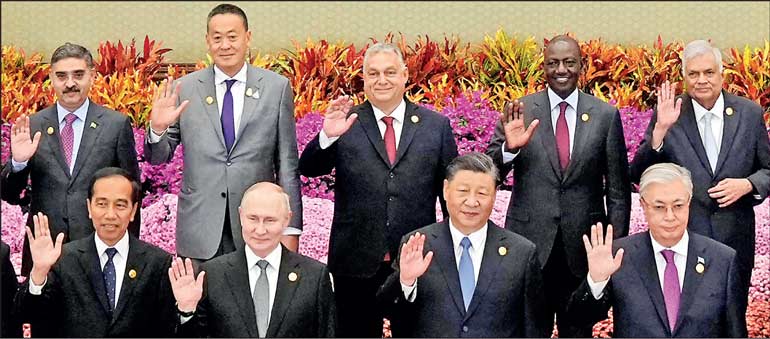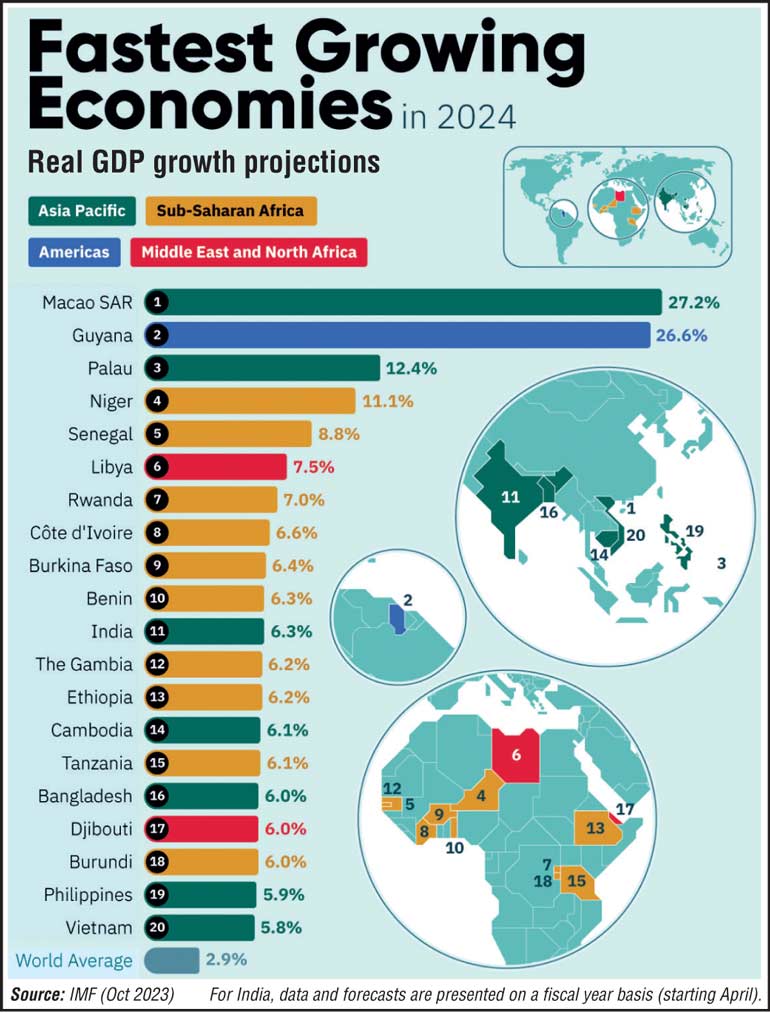Wednesday Feb 18, 2026
Wednesday Feb 18, 2026
Friday, 27 October 2023 00:02 - - {{hitsCtrl.values.hits}}

China’s President Xi Jinping with several world leaders including President Wickremesinghe at the meeting to celebrate Belt and Road Initiative (BRI) 10 years, his signature foreign and economic policy
 Budget proposals are to lay the basic foundation for transforming and reenergising an economy. What we need now are proposals for building a new economy suitable for the modern world, therefore the 2024 Budget proposals must be very different. It is therefore crucial for the Government and policymakers to identify the low-hanging fruits which when reaped can help to jumpstart the recovery. In this article, we will explore the key areas the Government can target for recovery. Beginning with tourism, new tourism initiatives, export-oriented agriculture, mineral resources, and investments in the financial sector supported by SMART taxation policies that can incentivise the private sector to invest.
Budget proposals are to lay the basic foundation for transforming and reenergising an economy. What we need now are proposals for building a new economy suitable for the modern world, therefore the 2024 Budget proposals must be very different. It is therefore crucial for the Government and policymakers to identify the low-hanging fruits which when reaped can help to jumpstart the recovery. In this article, we will explore the key areas the Government can target for recovery. Beginning with tourism, new tourism initiatives, export-oriented agriculture, mineral resources, and investments in the financial sector supported by SMART taxation policies that can incentivise the private sector to invest.
Tourism recovery
Tourism is one sector that can significantly contribute to GDP and provide employment opportunities. Therefore refreshing existing tourism assets burdened by crazy interest and interest penalties is a must to attract tourists. This entails refurbishing and promoting historical sites, cultural landmarks, and natural attractions that may have been overlooked or neglected. Government can collaborate with the private sector to upgrade infrastructure, improve accessibility, and invest in marketing campaigns to attract tourists. By doing so, the Government can tap into a potentially lucrative market, capitalising on the cultural and natural treasures.
While restoring existing tourism assets is essential, innovation is equally crucial to attract high paying tourists. New tourism initiatives can take various forms, such as eco-tourism, adventure tourism, or health and wellness tourism. These trends cater to evolving traveller preferences and can reinvigorate the tourism sector. For instance, promoting sustainable and eco-friendly tourism can not only attract conscious travellers but also foster environmental stewardship. As a result, such initiatives can boost economic growth while preserving the environment.
Export-oriented agriculture
Agriculture is a key sector with the potential to drive economic recovery, especially for Sri Lanka. By transitioning to export-oriented agriculture, we can tap into international markets, creating a reliable source of income. This entails identifying high-demand crops, improving agricultural practices, and investing in modern technology. Furthermore, value addition and agro-processing can increase the profitability of agriculture, creating jobs and supporting rural development. The Government therefore needs to create opportunities and offer incentives for the private sector to invest in agriculture.
Mineral resources
Sri Lanka is blessed with abundant mineral resources. We should at least now harness this wealth for economic recovery. Mining can be a significant source of revenue and employment, provided it is done sustainably and transparently. The Government needs to ensure that mining practices meet environmental standards and that profits are fairly distributed. Additionally, investing in the processing and refinement of raw minerals can add further value to the sector and create opportunities for technological innovation. The Government therefore needs to articulate a policy that creates confidence within the international investment community in this sector, that the country maintains the highest levels of governance in conducting business.
Financial sector
A robust and a stable financial sector will be the backbone for any economic recovery. The Government can attract domestic and foreign investments by implementing favourable policies and regulations that encourage capital flows. Strengthening the financial sector not only facilitates access to capital for businesses but also encourages savings and investment by individuals. Furthermore, embracing digital financial services and fintech innovations can enhance financial inclusion, making banking services accessible to a broader population. To facilitate economic recovery, the banking sector needs a comprehensive refresh and balance sheet de-risking. For this there is a need for industry consolidation – even bigger bank balance sheets, deep pocketed and engaged long term value shareholders who can participate in new capital and a change in ownership rules.
Poverty reduction
Sri Lanka has faced a foreign exchange crisis and a rising cost of living. These difficulties have had a significant impact on the country’s poor, leading to increased hardships, reduced access to basic necessities, and economic instability. The Government needs to improve the conditions of the poor with pro poor policies. For example; strengthen social safety net programs that provide financial assistance, food, or healthcare for vulnerable groups, such as women, children, and the elderly. Also for the youth; education and skills development and microfinance and small business support.
Conclusion
A pre-requirement for investments into the economy is macroeconomic stability and policy consistency in the country. Budget 24 provides that opportunity for the Government to make a strong statement. Sri Lanka also needs to invest in a strong human capital base and towards this end Sri Lanka needs to make serious investment in education and skill development and spend wisely on national security. Therefore the Government needs SMART budget proposals to facilitate a pathway to revitalise the Sri Lankan economy, strengthen the private sector interest in growth and increase revenue collection, whilst managing Government expenditure without adding more burdens on the existing taxpayers.
References:
https://www.worldbank.org/en/country/srilanka/overview
https://www.cfr.org/blog/chinas-belt-and-road-initiative-enters-its-second-decade-which-leaders-went-beijing-celebrate
